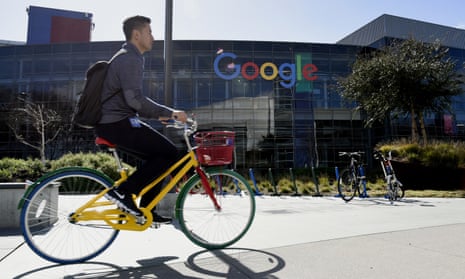Google reportedly fired a software engineer on Monday after a document he wrote criticising the company’s diversity efforts and attributing the tech industry’s gender imbalance to biological differences between men and women went viral.
“To suggest a group of our colleagues have traits that make them less biologically suited to [Google’s] work is offensive and not OK,” Google CEO Sundar Pichai wrote in a memo to employees. “It is contrary to our basic values and our code of conduct.”
The firing of the memo’s author, who identified himself as James Damore in an email to the Guardian, was first reported by Bloomberg. Google declined to comment on an individual employee’s case, but tweeted a link to further comments by Pichai: “Our co-workers shouldn’t have to worry that each time they open their mouths to speak in a meeting, they have to prove they are not like the memo states, being ‘agreeable’ rather than ‘assertive’, showing ‘lower stress tolerance’ or being ‘neurotic’.”
The 10-page “manifesto” was initially published internally, but was leaked to the press on Saturday after prompting a firestorm within the company. The document, entitled Google’s Ideological Echo Chamber, takes aim at Google’s “diversity and inclusion” initiatives, such as implicit bias training and programs to promote women and under-represented minorities, and argues that the company is intolerant of conservative political views.
“When it comes to diversity and inclusion, Google’s left bias has created a politically correct monoculture that maintains its hold by shaming dissenters into silence,” the author wrote.
The author also made questionable claims about supposedly innate differences between men and women to account for the extreme gender disparity in Google’s workforce.
Like most of Silicon Valley’s top tech companies, Google is overwhelmingly male, white and Asian. Women make up just 20% of the technical workforce, and African Americans just 1%, according to Google’s most recent diversity report.
Google is also engaged in a legal battle with the US Department of Labor, which is investigating the company for wage discrimination. A DOL lawyer told the Guardian in April that its analysis of wage data showed “that discrimination against women in Google is quite extreme, even in this industry”.
“At this point the department has received compelling evidence of very significant discrimination against women in the most common positions at Google headquarters,” the attorney said.
Google denies the charges.
The internal document sparked a heated debate within Google and the tech industry at large, with many Google employees expressing anger and dismay about its contents on Twitter. Many called for the author’s firing, arguing that his opinions created a hostile work environment, while others raised concerns about sacking an employee for expressing unpopular views.
Rightwing news site Breitbart covered the controversy extensively, focusing on the perceived culture of “political correctness” in the tech industry, and casting the memo’s author as a victim of a “witch hunt” by “social justice warriors”.
In his memo, Pichai acknowledged concerns over freedom of expression, adding: “Many points raised in the memo – such as the portions criticising Google’s trainings, questioning the role of ideology in the workplace, and debating whether programs for women and underserved groups are sufficiently open to all – are important topics.
“The author had a right to express their views on those topics – we encourage an environment in which people can do this and it remains our policy to not take action against anyone for prompting these discussions.”
The CEO told staff he would be returning from a vacation early in order to hold a town hall meeting to discuss “how we create a more inclusive environment for all”.
Google is the latest company to face issues of sexism, discrimination and harassment this year. The Uber CEO, Travis Kalanick, resigned in June and an additional 20 employees were fired amid the fallout from allegations of widespread sexual harassment and gender discrimination at the company.
The tech industry has also been rocked by accusations that a number of high-profile venture capitalists have harassed female startup entrepreneurs.
